7 Language Learning Tips from Langfest 2017
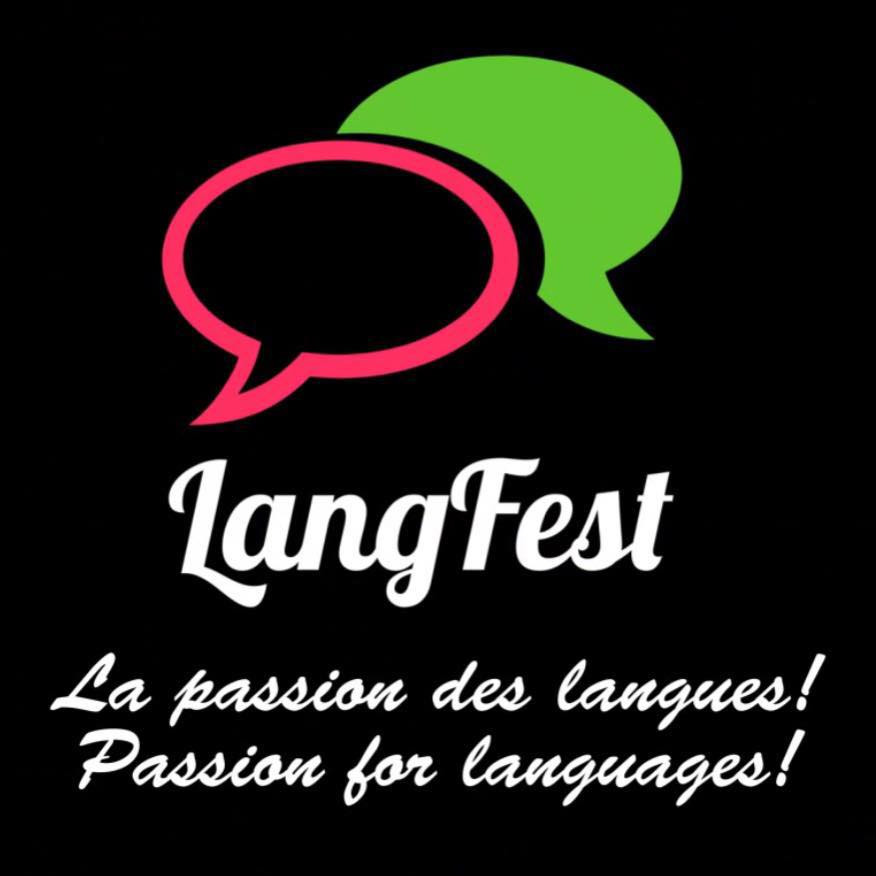 Langfest 2017 in Montreal brought together over 300 language enthusiasts from all over the world. Its speakers highlighted many language learning tips that we and others often blog about.
Langfest 2017 in Montreal brought together over 300 language enthusiasts from all over the world. Its speakers highlighted many language learning tips that we and others often blog about.
It's the second year of this event, which last year was called “North American Polyglot Symposium” or NAPS.
LangFest is a perfect new name for this three-day event. The conference aims to be inclusive, you really don't have to speak a lot of languages to benefit.
At LangFest you'll hear many different languages spoken throughout. For most languages, it's typically easy to find conversation partners.
Again this year, the talks covered a large variety of language topics. Many of the speakers shared ideas on how to make learning a new language more interesting and efficient.
Learning a language is not a task with a quick recipe. It's a personal process that changes as you go along and as you improve. It involves discovery, commitment, self development, patience, and a type of discipline that you enjoy and can sustain.
We're avid language learners ourselves. Besides running our GamesforLanguage site, we're always eager to learn more about how to learn languages better.
Our participation at LangFest 2017 was a way to spark up our own motivation and to connect with other language enthusiasts.
The language learning tips below are from the talks we listened to and from our conversations from the speakers we met.
Over the coming weeks, you can go on LangFest's YouTube site where the individual talks will be uploaded. Some of the interviews done at the conference are already available. If you're using self-teaching language programs, you'll certainly recognize one or more of the names below.
Joey Perugino - Language Learning with Music
Together with Tetsu Yung, Joey Perugino is one of the organizers  of LangFest Montréal.
of LangFest Montréal.
In his talk,“Relations inter-culturelle - Cross cultural relationships”, Joey described how he learned Italian, Spanish, and Portuguese as a child and as a young man.
He listened to songs, read children's books, and watched telenovelas. A particular fun experience was when he acted as interpreter for his Italian friends on a visit to Cuba.
The key for Joey early on was music. He would listen to songs many, many times. He was especially fond of the Italian pop singer-songwriter Toto Cotugno, the Spanish child actor and singer Joselito, and the Venezuelan singer-songwriter Franco de Vito.
Tip #1: Music is a powerful tool for internalizing the sounds, rhythms, and vocabulary of a new language.
(For me, pop songs definitely boosted my English, which I learned as a teenager. No wonder then that at Gamesforlanguage, we also advocate learning with songs. Blog posts that review some of our favorite Spanish, French, Italian, and German songs are among our most popular ones. Joey mentioned that he's struggling a little with German. I'm on the lookout for some more catchy German songs for him.)
Last year we came across a program called Language Zen, which uses songs in an innovative and fun way to learn Spanish. (Language Zen is now one of our partner sites.)
Stephen Krashen: Comprehensible Input
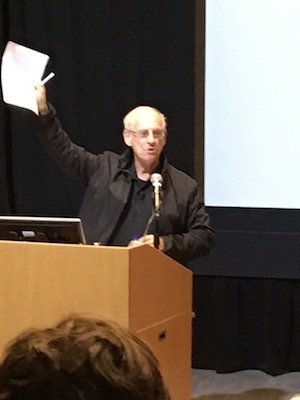 A linguist and Professor Emeritus of the University of Southern California, Dr. Stephen Krashen is the dean of the “input hypothesis” for second language acquisition and headlined the evening session of the first day.
A linguist and Professor Emeritus of the University of Southern California, Dr. Stephen Krashen is the dean of the “input hypothesis” for second language acquisition and headlined the evening session of the first day.
His humorous and informational talk, entitled “Polyglots and the Comprehension Hypothesis” circled around the idea that language acquisition is gradual, and that it requires regular and substantial input.
In his studies about 'comprehensible input', Stephen also found that teaching explicit grammar has limited effect and that using grammar consciously during a conversation is very hard.
Most importantly, input has to be so interesting that you forget you're in another language.
Tip #2: Read and listen to material that really interests you and find a level where you can understand about 80%. Don't agonize about perfection. Note Stephen's quote of Kató Lomb: “Language is the only thing worth knowing poorly."
(GamesforLanguage's travel story courses apply this input comprehension theory for early learners: the initial dialogue of each story-lesson is broken down; unknown words are practiced, so each sentence becomes comprehensible by the lesson's end.)
Mark Pentleton: Start with Short Spurts
The founder of the Coffee Break Conversation series (Coffeebreakacademy.com), Mark Pentleton, reviewed the origin of the idea to fit language learning into the short time of a “coffee break”.
Mark Pentleton, reviewed the origin of the idea to fit language learning into the short time of a “coffee break”.
Starting in 2006 with the Radio Lingua Network, when podcasts were still not well known and faced technical problems of device memory, bandwidth, etc., Coffee Break Conversations have now come into their own. The format is a short dialogue between a teacher and a student.
Tip #3: Mini-lessons are a great way to get started, and to keep going even if you're too busy for 'real learning.' With mobile technology, we can read or listen to the language we're learning even in chunks of minutes at a time, and that may keep us engaged and motivated in the language.
(For those learners who don't have time for a full lesson, GamesforLanguage's “Quick Language Games” provide a quick and fun option.)
Steven Kaufmann: Forget and Relearn
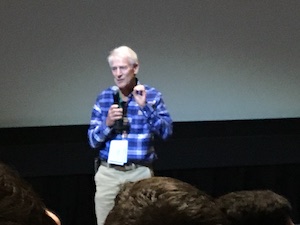 Canadian diplomat turned polyglot plus language teaching theorist, and founder of LingQ.com, Steven Kaufmann also insists, like his friend Krashen, that 'comprehensible input' is key. Stories with audio - at the right level - provide excellent materials.
Canadian diplomat turned polyglot plus language teaching theorist, and founder of LingQ.com, Steven Kaufmann also insists, like his friend Krashen, that 'comprehensible input' is key. Stories with audio - at the right level - provide excellent materials.
In his talk, “Meaningful and Compelling Input”, Steven focused on some specific details of how we learn with interesting and understandable materials.
For one, language learning means learning to notice how the same words show up in different contexts and in various grammar patterns. Every time we see the same word or phrase in context, we're relearning it. As a matter of fact we're constantly forgetting and relearning all the time.
For learning a language with comprehensible input, Steven's guideline is 70% audio and 30% reading. Speaking is extra.
Tip #4: It's okay to forget words, and seeing them again and again is a natural (and painless) way to learn. By the same token, reviewing endless lists of words and grammar drills can be boring, which may ultimately be counter productive.
Shannon Kennedy: Use Outside Skills for Language Learning
Saxophonist and singer-songwriter Shannon Kennedy is also a traveler and  language lover. On her Blog Eurolinguiste.com she shares her adventures and language learning tips.
language lover. On her Blog Eurolinguiste.com she shares her adventures and language learning tips.
Shannon's talk “Applying Outside Skills in Language Learning” was about building on the skills that you know. As a musician, she's used to performing. And quite rightly, she equates conversations in a foreign language with performances.
By the same token, music theory has its equivalent in grammar. Then there's passive and active listening, which applies both to music and language.
If you do sports, you'll know that a little bit of training every day makes a big difference. And, you'll also know that training with others who are better than you will improve your performance.
Parenthood brings with it the skill of approaching things from different angles, and the knowledge such an approach gives you is essential.
Science focuses on testing and fieldwork. A good investor accepts uncertainty, takes calculated risks, accepts mistakes, and does his or her own research. The list goes on.
Tip #5: Because learning a language involves many daily tasks, applying any skills you know well can be very helpful.
Grégoire Lahaie: Learn Some of the Local Language
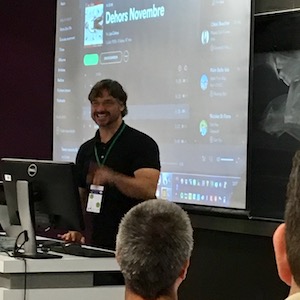 A native of the Province of Québec, Gégoire Lahaie is a freelance translator for English-French and Spanish-French.
A native of the Province of Québec, Gégoire Lahaie is a freelance translator for English-French and Spanish-French.
Grégoire's workshop “Atelier sur la langue québécoise - Workshop on Quebec language”, was a fun introduction to québécois.
He covered pronunciation matters, such as diphtongization ('père' is pronounced 'paèr'); how consonants change before u and i (d is pronounced 'ds-', as in 'dsurant'); and typical contractions ('je suis' is contracted to 'j'su'). He also mentioned a handful of québécismes, and explained a couple of swears.
I speak French, but as I walked around Montreal, it took me a while to get used to the local language. Grégoire's explanations actually helped me understand some of the local pronunciation patterns. I'm not able to speak Québecois, but my ear is now better tuned to understanding when I hear it spoken.
Tip #6: It's really worth tuning in to the local language of the place you're visiting. You don't need to be fluent. Learning some basic phrases, and learning how to pronounce the language makes a visit so much more enjoyable.
Richard Simcott: Talk to People
A life-long language learner, Richard Simcott is founder plus co-organizer of the International “Polyglot Conference" - which is now in its 5th year and is meeting in Iceland end of October.
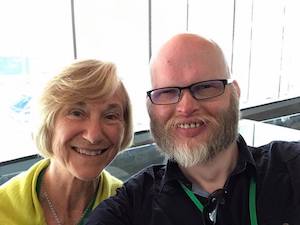 Richard has done much to bring language enthusiasts together. (Yes, it's Richard and me on this picture.) In his talk, “Language Learning Worlds”,he shared stories from his own life and how he discovered his love for languages. Languages, he realized, are “what got him up in the morning.”
Richard has done much to bring language enthusiasts together. (Yes, it's Richard and me on this picture.) In his talk, “Language Learning Worlds”,he shared stories from his own life and how he discovered his love for languages. Languages, he realized, are “what got him up in the morning.”
We all live in many worlds where languages can play an important role: family, friends, city, region, country, continent. Once we open our eyes and hearts, we can find lots of opportunities to bring languages, and friends with them, into our lives.
So far, Richard has studied 40 languages and is fluent in quite a few (find out more on his site, speakingfluently.com). Many of us were able to try out some of the languages with him at LangFest. It was a pleasure to chat with him on several occasions and it was obvious that he had my languages well covered.
Tip #7: Talk to people when you're ready to talk in your new language, and choose low anxiety situations. (That includes LangFest!)
These are just a few insights from some of the talks we attended. But, of course they don't do justice to the richness of ideas and the enthusiasm present at the conference.
During the three days of LangFest and the Sunday night picnic in Parc La Fontaine, we found many opportunities to talk with other language enthusiasts. We also met many of the speakers in person, and connected with old and new friends, some of whom we had known only online until then.
So we were glad to also connect again with Benny Lewis (fluentin3months.com), Olly Richards (Iwillteachyoualanguage.com), Lindsay Williams (Lindsaydoeslanguages.com), and to meet Kirsten Cable (fluentlanguage.co.uk), and the educator/performer Paulino Brener (paulinobrener.com).
Here I should mention Kendal Knetemann, founder and co-owner of the free language learning site LingoHut.com. We started our collaboration online two years ago and celebrated our friendship in person with a dinner in Montreal!
In all, LangFest was enormously fun and inspiring. And you sure can't beat the setting - the cafés, bars, and restaurants, and hearing French all around.
Bio: Ulrike Rettig is the co-founder of GamesforLanguage.com. She is a lifelong language learner, growing up in Austria, the Netherlands, and Canada. You can follow her on Facebook, Twitter and Instagram, and leave any comments with contact or below.
